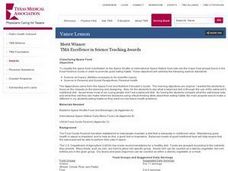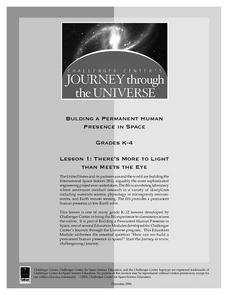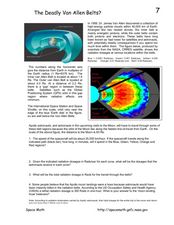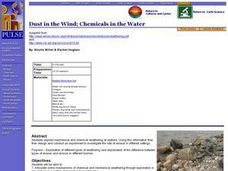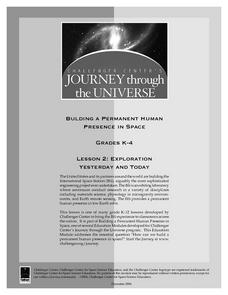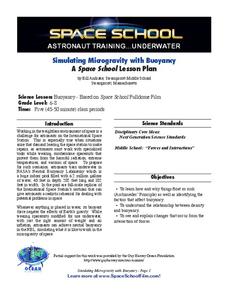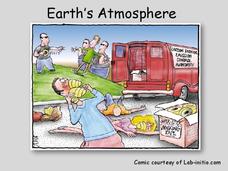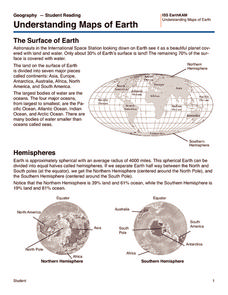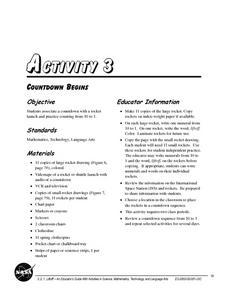International Technology Education Association
Pixel This!
Did the image I drew match the image you saw? By simulating a satellite and a ground station, teams of two transmit data in the form of pixels in order to recreate an image. They use four different levels of brightness, creating slightly...
Curated OER
Classifying Space Food
Students write a written summary of what they have learned about the astronaut nutritional diet in comparison with their own diet habits.
Curated OER
Satellite Tracker
Students use satellite tracking software to monitor different satellites. They predict and graph the motion of the space station. They create a 3-D display of its path and share it with the class.
Curated OER
Digestive System
Students analyze how the digestive system works by taking the food we eat and breaking it down for our bodies to use for various reasons. They list the major components of the digestive system and draw a diagram. They explain how...
Curated OER
There's More to Light than Meets the Eye
Learners explore the concept that not all light is visible to the
human eye. Although UV light is not visible, it can still be harmful, causing sunburns or skin cancer. They use special beads to detect UV light around the school....
Curated OER
The Deadly Van Allen Belts?
In this Van Allen Belts activity, high schoolers read about the deadly affects of the high energy particle clouds located around the Earth. Students answer 4 questions about the dosages of radiation astronauts receive in the zones of the...
NASA
Cleaning Water
Give young scientists a new appreciation of fresh, clean drinking water. After learning about the ways astronauts recycle their air and water, your class will work in small groups creating and testing their very own water...
Education World
Every-Day Edits: Ellis Island
In this proof reading instructional activity, learners read a paragraph about Ellis Island. Students locate and correct 10 errors in the paragraph.
Curated OER
The effects of microgravity
Fourth graders are given a scenario in the lesson that presents a problem that needs to be solved. They conduct research from multiple sources in order to gather information. This is used to contribute to possible solutions proposed by...
Curated OER
Dust in the Wind; Chemicals in the Water
Students explore mechanical and chemical weathering at stations. They articulate some mechanisms of chemical and mechanical weathering through exploration in a lab. Students stations describe how chemical weathering differs from...
Curated OER
Outerspace: Frontier for Personal Health and Hygiene
Students view photos of astronauts sleeping, eating, bathing, and using the toilet, and discuss hygiene problems in a zero-gravity environment. They contrast hygiene habits in space to those on Earth, and create storybooks illustrating...
Curated OER
Exploration Yesterday and Today
Students compare and contrast the voyages of early explorers with the space explorations of the present day. After reading the biographies of Benjamin Banneker and Timothy Livengood, students create a Venn Diagram comparing and...
Curated OER
Atmospheric Shielding from Radiation I
In this radiation worksheet, students calculate the distance of a satellite in orbit to determine the placement of a radiation detection device. This worksheet has 2 problems to solve.
Curated OER
BOUNCING INFORMATION AROUND
Students examine how satellite signals are sent and duplicate it with a mirror, flashlight and black paper.
Curated OER
Atmospheric Shielding from Radiation III
In this radiation activity, students compare the efficiency of planetary atmospheres to shielding from radiation. This activity has 2 problems to solve.
Curated OER
Atmospheric Shielding from Radiation II
In this radiation worksheet, students calculate the total shielding along several specific directions defined by the angles. This worksheet has 3 problems to solve.
Florida International University
Simulating Microgravity with Buoyancy
How do astronauts know how to live and work in a weightless environment? It doesn't come naturally! Junior physicists conduct experiments to examine the link between buoyancy and microgravity. Each activity illustrates a different aspect...
Science Geek
Earth's Atmosphere
Ozone gas absorbs the harmful UV-B rays and helps protect humans. An informative presentation begins with the layers of the earth's atmosphere, the pressure and temperature in each of the layers, the ozone layer, the ozone cycle,...
Institute for Geophysics
Understanding Maps of Earth
Here is your go-to student resource on primary geography concepts, including facts about the surface of the earth and its hemispheres, latitude and longitude, globes, types of maps, and identifying continents and oceans.
Curated OER
NASA Anniversary
In this NASA Anniversary worksheet, learners complete activities such as reading a passage, phrase matching, fill in the blanks, correct words, multiple choice, spelling, sequencing, scrambled sentences, writing questions, survey, and...
Curated OER
Newton's Laws: Making Simple Rockets
Students can use rocketry to understand Newton's Three Laws of Motion.
Curated OER
Simple Rocket Science
Students demonstrate Newton's Third Law of Motion. They discuss the history of rockets, observe how a rocket works, and draw a picture and write an explanation of the balloon experiment.
Curated OER
Countdown Begins
Students explore the countdown sequence for a rocket launch. They watch a video of a rocket launch, discuss the significance of the countdown sequence, and place ten paper rockets in the proper sequence.

